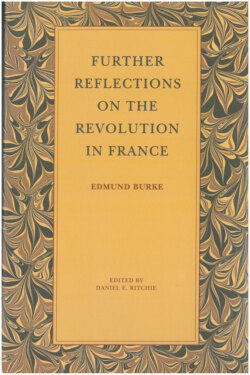Читать книгу Further Reflections on the Revolution in France - Edmund Burke - Страница 12
На сайте Литреса книга снята с продажи.
Оглавление2
LETTER TO PHILIP FRANCIS
February 20, 1790
Burke grew increasingly alarmed over his colleagues’ favorable view of the French Revolution. His friend and political ally Philip Francis apparently gave credence to the poisonous propaganda that had been issuing for a decade about the sexual appetite of the Queen of France—the ironic result of her attempt to act in a more “natural” and less regal manner—as if a great civilization should be razed if the queen were found guilty of fornication. Other interpreters compared the events in France to Britain’s Glorious Revolution of 1688–89 in order to serve contemporary revolutionary purposes. On November 4, 1789, the Revolution Society, formed originally to commemorate the Glorious Revolution, heard this comparison made by Dr. Richard Price, a Unitarian minister and promoter of the American War of Independence. Price is mentioned in the letter below, along with William Petty, 2nd Earl of Shelburne and Marquis of Lansdowne, who was an old antagonist of Burke and the Rockingham Whigs.
Burke had known Philip Francis since at least 1770, and from 1785 Francis had assisted Burke in the prosecution of Warren Hastings, Governor-General of India. Burke had sent Francis a short portion of the Reflections in draft form, and Francis had written back disapprovingly. He believed that the best hope of dissuading Burke from proceeding with the Reflections was to argue that combat with the English admirers of the French Revolution was beneath him and to warn Burke of the pamphlet war that would ensue. Of the famous purple patch on Marie Antoinette, Francis’s comment was brutal: “pure foppery.” Burke responds by explaining the sympathies that a suffering queen should evoke in a properly educated gentleman. Those sympathies contrast markedly with the revolutionary sympathies that inspired Price, Shelburne, and their “set.”
